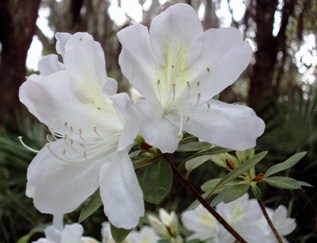
EDITOR’S NOTE: A University of Florida faculty member and Nassau County Extension Horticultural Agent, Rebecca Jordi addresses some of the questions she receives about landscaping and gardening in northeast Florida, in GARDEN TALK. The Extension also offers helpful clinics throughout the year, providing assistance to local gardeners on Amelia Island and in the surrounding areas of Nassau County, Florida.
____GARDEN TALK_____
QUESTION: Are azaleas toxic to pets and cattle? BC
JORDI: Both wild and domesticated varieties of azalea can be toxic to animals. The severity of the symptoms will differ depending on the size of the animal and how much was ingested. It would be unusual for dogs or cats to ingest azalea leaves if they are well fed and normally kept indoors. However, that is not the case with cattle or horses which might be tempted by the dark green leaves growing just within reach of their mouths.
The animal may experience nausea, vomiting and possibly labored breathing. If any of these symptoms occur, please contact your veterinarian as soon as possible. They will provide the best and safest instructions for immediate care.
If you suspect your pet or livestock may have eaten plant material, it would be wise to take samples to the vet just to be safe. Consider removing the azaleas to another area away from your livestock so you can enjoy the plants and they will not be a temptation to the animals. The attached publication is from Cornell University which will provide a short list of poisonous plants to avoid if you have a pet attracted to plants. http://counties.cce.cornell.edu/yates/mg7.4.01.htm
QUESTION: How do I keep rabbits out of my garden? RC

JORDI: It is often difficult to determine what animal may be eating your plants. However, the clean cut you described is most likely a rabbit. Of course, the fact you have seen them adds validity to the possibility of rabbits being the culprit. Deer do not make clean, nearly perfect cuts to the plant. You can try to fence them out but this is often expensive. Repellents made with ammonium soaps sprayed directly on the leaves have been found to deter deer and rabbits. Chemicals such as hot sauce containing capsaicin can be applied before fruit is formed or after harvest had been successful at repelling deer and rabbits. Capsaicin is a taste repellent which is unappealing to rabbits. These repellants may need to be reapplied after heavy rains or after a lengthy period of time. Please remember to follow the directions on the label for the best results.
Marsh hares are found commonly throughout Florida. They are smaller than a cotton tail rabbit with brownish-grey fur. Marsh hares can produce three young as many as ten times a year. It is no wonder their numbers can easily become out of control which is why it is so important to protect our predatory animals such as snakes and hawks.
QUESTION: Can I leave my orchid in the plastic pot it came in? SC

JORDI: It really should to be re-potted in an appropriate orchid pot. The first preference is one made of terracotta with holes in the side to encourage and permit appropriate air flow. Providing the right amount of air circulating around the roots discourages fungal disease.
Be careful when choosing a soil medium as the roots require good air circulation and water should drain readily. Therefore, stay away from soil which has a tendency to hold water for long periods of time. We suggest selecting a potting mix developed specifically for orchids.
We will demonstrate a step-by-step method to repot orchids at the next Landscape Matters class. This month’s free orchids class will be conducted by UF/IFAFS Master Gardener volunteer Shirley Lohman on June 16, 2010 at 10 am, at the Nassau County Governmental Complex. I have seen a few orchids the last few weeks with mealybugs and leafhoppers. If you have problems with your orchids, please feel free to bring them to the class and we can provide a diagnosis and solution.

University of Florida/IFAS
Nassau County Extension
Environmental Horticulture Agent III
543350 U. S. Highway #1
Callahan, FL 32011
904 548-1116 or 904 879-1019
http://nassau.ifas.ufl.edu
